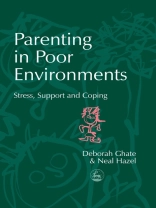With a unique focus on the effects of poverty on parenting in Britain, this book explores what professionals and policy makers can do to support families living in poverty.
The authors examine community-level poverty and its relationship to family and individual problems such as low income, poor mental health and child behavioural difficulties. Using data from the first nationally representative survey of parents living in especially poor circumstances, they assess the wider help parents receive, both through formal support services and through informal networks of family and friends. Drawing on a study of 1750 parents by the Policy Research Bureau for Department of Health, this book shows what service-users think of the resources available to them and how policy and practice in family support services could be improved.
Tabella dei contenuti
Part 1: Introduction and Background. 1. Introduction. 2. Methodology and demographic characteristics of the sample. Part 2: Parents under stress. 3. Stress factors at the individual level. 4. Stress factors at the family level 5. Stress factors at the community and neighbourhood level. Part 3: Social support to parents in poor environments. 6. Informal support. 7. Semi-formal support. 8. Formal support. 9. Support deficits in poor environments. Part 4: Risk, support and coping. 10. Coping and not coping. 11. Coping strategies. 12. Social support and coping: Does support make a difference? Part 5: Summary of key Findings, implications and messages for policy and practice. 13. Patterns of need and support: Priority groups for policy and practice attention. 14. What do parents want from support? Messages for policy and practice. Appendices. References. Index.
Circa l’autore
Neal Hazel was a Senior Research Fellow at the Policy Research Bureau. Since 2003 Neal Hazel has been a lecturer in criminology at the University of Salford, UK.












